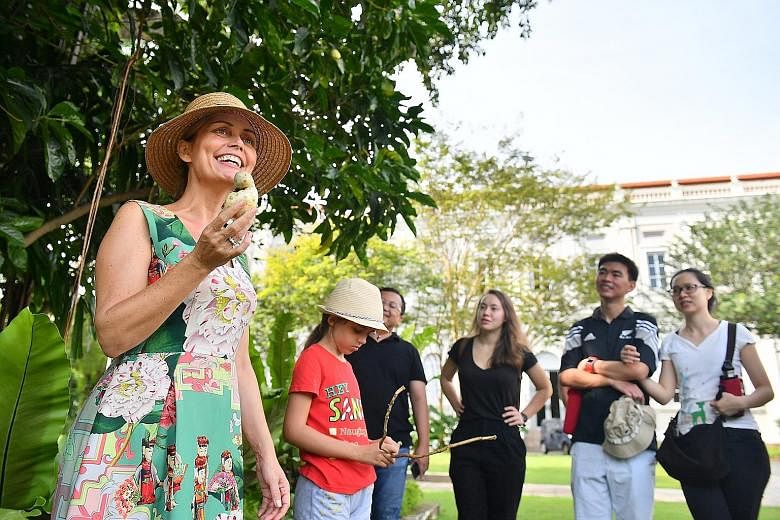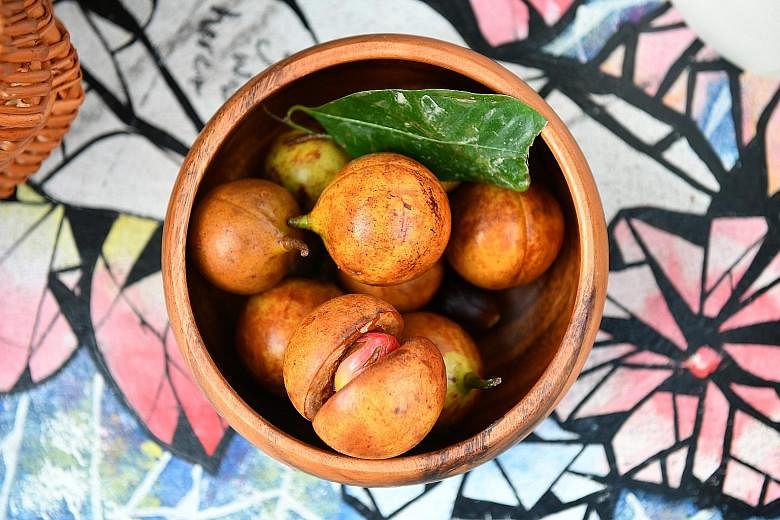Strolling through Fort Canning Park, Mrs Kristine Oustrup Laureijs paused and pointed out a bird's nest fern to her tour group.
"Did you know that aboriginals in Taiwan stir-fry young bird's nest fern?" the Singapore-based Danish artist asked, before taking a frond from her basket and distributing it to the small crowd to nibble on.
She originally organised eight tours on identifying edible plants in Singapore through Mamakan Art Collective, starting from last October. All the sessions soon sold out and she ended up leading almost 200 people across 12 tours.
The 45-year-old told The Straits Times: "We've discovered more than 100 edible plants growing in the centre of Singapore. And we have been amazed by all these treasures growing right in front of us."
Yet, enthusiastic foragers may have inadvertently wandered into a legal grey zone. Unlike countries where one can pluck fruits or plants on public land, people here cannot harvest from state land managed by the Singapore Land Authority or the National Parks Board (NParks).
Said NParks group director of parks Chia Seng Jiang: "Members of the public are not allowed to pluck, collect or keep fruits that have fallen naturally to the ground in our parks, nature reserves and along roads in NParks-managed areas.
-
12
Number of tours artist Kristine Oustrup Laureijs organised, up from the eight she originally planned, to identify edible plants such as nutmegs in Singapore.>100
Said Mrs Oustrup Laureijs: "We've discovered more than 100 edible plants growing in the centre of Singapore."50
Number of people who showed up for a foraging tour through the NUS campus last month, organised by Project 33, which teaches people to grow and cook their own food.
"Individuals and groups who wish to collect seeds, cuttings or fruits for research, education, propagation, charity or other purposes should approach NParks for permission, which will be assessed on a case-by-case basis."
Yet it can be hard to know which land belongs to which government agency, and what rules apply.
For instance, Mrs Oustrup Laureijs knew she could not pluck living plants. She got her samples from acquaintances who owned these plants.
She also got the green light from NParks to collect edible plant waste from Fort Canning Park.
But learning that picking fallen parts is illegal surprised her. She had made jam from the dropped berries of rukam masam trees.
Such misunderstandings may become more common. Four foragers told The Straits Times that they have observed a growing public desire to learn about the local edible landscape.
Ms Michelle Lai, 26, who works freelance on nature projects, has occasionally led foraging tours over the past three years.
She said social media chatter and discussions among food and beverage industry players - restaurants and cocktail bars are also turning to foraged ingredients - show interest here is on the rise.
Interest group Project 33, which teaches people how to grow and cook their own food, led a foraging tour through the National University of Singapore campus last month.
Director Alexius Yeo, 32, said the group planned for about 20 people to come but 50 showed up. He added that he would plan more trips.
He said he understood why foraging would concern the authorities, but stressed that the activity here is primarily about education and is not destructive.
"I want to teach people that there are a lot of easy-to-grow edible plants in Singapore.
"We're always weeding. Why don't you learn which of your weeds you can eat?"
Data scientist Ashley Khor, 32, who took part in Mrs Oustrup Laureijs' tour, said it was a "wonderful morning taking a walk through the familiar and unfamiliar, learning about the botanicals that are in fact all around us in our edible Garden City".




